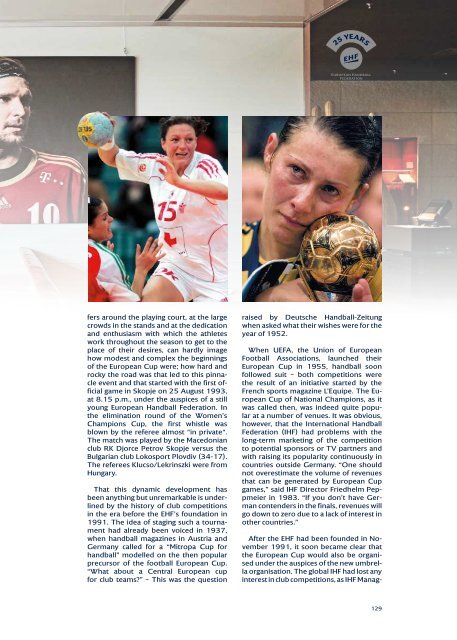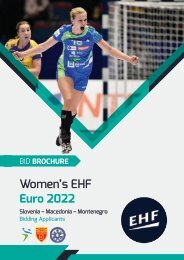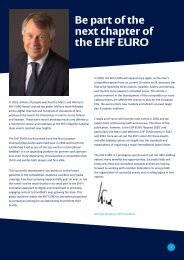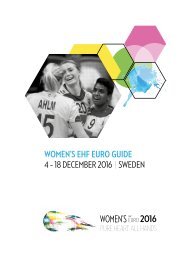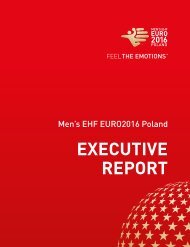ehf_25yers_book_webversion
You also want an ePaper? Increase the reach of your titles
YUMPU automatically turns print PDFs into web optimized ePapers that Google loves.
fers around the playing court, at the large<br />
crowds in the stands and at the dedication<br />
and enthusiasm with which the athletes<br />
work throughout the season to get to the<br />
place of their desires, can hardly image<br />
how modest and complex the beginnings<br />
of the European Cup were; how hard and<br />
rocky the road was that led to this pinnacle<br />
event and that started with the first official<br />
game in Skopje on 25 August 1993,<br />
at 8.15 p.m., under the auspices of a still<br />
young European Handball Federation. In<br />
the elimination round of the Women’s<br />
Champions Cup, the first whistle was<br />
blown by the referee almost “in private“.<br />
The match was played by the Macedonian<br />
club RK Djorce Petrov Skopje versus the<br />
Bulgarian club Lokosport Plovdiv (34-17).<br />
The referees Klucso/Lekrinszki were from<br />
Hungary.<br />
That this dynamic development has<br />
been anything but unremarkable is underlined<br />
by the history of club competitions<br />
in the era before the EHF’s foundation in<br />
1991. The idea of staging such a tournament<br />
had already been voiced in 1937,<br />
when handball magazines in Austria and<br />
Germany called for a “Mitropa Cup for<br />
handball” modelled on the then popular<br />
precursor of the football European Cup.<br />
“What about a Central European cup<br />
for club teams?” – This was the question<br />
raised by Deutsche Handball-Zeitung<br />
when asked what their wishes were for the<br />
year of 1952.<br />
When UEFA, the Union of European<br />
Football Associations, launched their<br />
European Cup in 1955, handball soon<br />
followed suit – both competitions were<br />
the result of an initiative started by the<br />
French sports magazine L’Equipe. The European<br />
Cup of National Champions, as it<br />
was called then, was indeed quite popular<br />
at a number of venues. It was obvious,<br />
however, that the International Handball<br />
Federation (IHF) had problems with the<br />
long-term marketing of the competition<br />
to potential sponsors or TV partners and<br />
with raising its popularity continuously in<br />
countries outside Germany. “One should<br />
not overestimate the volume of revenues<br />
that can be generated by European Cup<br />
games,” said IHF Director Friedhelm Peppmeier<br />
in 1983. “If you don’t have German<br />
contenders in the finals, revenues will<br />
go down to zero due to a lack of interest in<br />
other countries.”<br />
After the EHF had been founded in November<br />
1991, it soon became clear that<br />
the European Cup would also be organised<br />
under the auspices of the new umbrella<br />
organisation. The global IHF had lost any<br />
interest in club competitions, as IHF Manag-<br />
129


